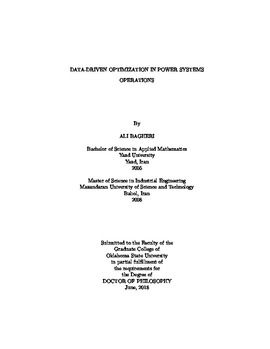| dc.contributor.advisor | Zhao, Chaoyue | |
| dc.contributor.author | Bagheri, Ali | |
| dc.date.accessioned | 2019-03-20T19:25:33Z | |
| dc.date.available | 2019-03-20T19:25:33Z | |
| dc.date.issued | 2018-06 | |
| dc.identifier.uri | https://hdl.handle.net/11244/317631 | |
| dc.description.abstract | Today's power systems are large scale systems consisting of multiple generating stations, load zones (distributors or utilities) and very complex interconnected power transmission networks. One of the major issues for power systems operators is that they face with several sources of uncertainty such as equipment failure uncertainty and demand uncertainty in the power systems operations. Moreover, the growing trend in renewable energy capacity installments has added a higher level of uncertainty to power systems operations. Therefore, uncertainty management has recently become one of the most challenging issues in power system operations and control. | |
| dc.description.abstract | However, in many cases, partial information of the uncertain parameters are available. Distributionally robust optimization is a newly emerged optimization approach to address optimization problems under uncertainty with partial information. In this study, we develop efficient distributionally robust optimization models to address several challenging problems arising in power systems operations. | |
| dc.description.abstract | First, we propose a data-driven approach to solve the stochastic transmission expansion planning problem under demand uncertainty. Then, we develop a data-driven approach to deal with the stochastic transmission system hardening planning problem in the presence of wind generation uncertainty and multiple simultaneous disruptive events. Afterward, we propose two reliability analysis schemes for the power transmission system hardening under distributional uncertainty of random contingencies. Finally, we present a data-driven chance-constrained stochastic unit commitment (power generation scheduling) under wind power uncertainty, in which the chance constraint controls and limits the level of energy imbalance. In all cases, we reformulate the original problems to two-stage stochastic mixed integer programs. Then, we deploy decomposition approaches to solve the developed models. | |
| dc.format | application/pdf | |
| dc.language | en_US | |
| dc.rights | Copyright is held by the author who has granted the Oklahoma State University Library the non-exclusive right to share this material in its institutional repository. Contact Digital Library Services at lib-dls@okstate.edu or 405-744-9161 for the permission policy on the use, reproduction or distribution of this material. | |
| dc.title | Data-driven optimization in power systems operations | |
| dc.contributor.committeeMember | Liu, Tieming | |
| dc.contributor.committeeMember | Yousefian, Farzad | |
| dc.contributor.committeeMember | Guo, Yuanxiong | |
| osu.filename | Bagheri_okstate_0664D_15832.pdf | |
| osu.accesstype | Open Access | |
| dc.type.genre | Dissertation | |
| dc.type.material | Text | |
| thesis.degree.discipline | Industrial Engineering and Management | |
| thesis.degree.grantor | Oklahoma State University | |
